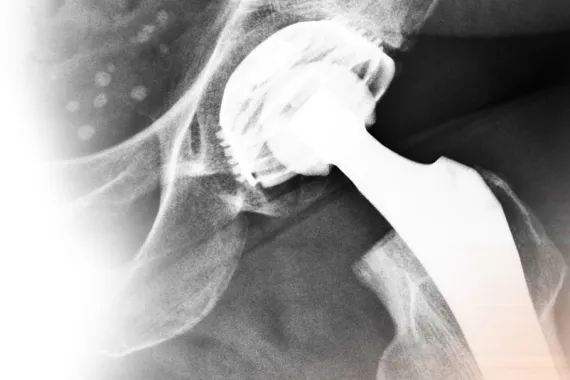
The Legal Team
Medical Attorneys
Case Overview
The last thing you want to find out after hip replacement surgery is that the replacement part you received may prematurely fail and cause severe pain and other serious injuries.
Metal-on-metal hip devices were originally thought to be a more durable alternative to ceramic or plastic models, but some studies have shown that they may deteriorate faster, expose patients to high levels of metals such as cobalt and chromium, and fail at a higher rate than older implants.
In fact, approximately one in 12 recipients of metal-on-metal devices may require corrective surgery within five years of implantation.
Metal-on-Metal Hip Replacement Side Effects
Side effects may include:
- Blood test results that show high levels of chromium and cobalt caused by metal debris
- Bone loss caused by device loosening
- Clicking, popping or grinding in the area of the hip implant
- Difficulty and pain when walking, standing or carrying weighted objects
- Dislocation or loosening of the implant
- Earlier than normal failure of the hip replacement
- Fractured hipbone
- Infection
- Leg length discrepancy
- Metallosis (metal flakes released into the bloodstream causing metal toxicity, pseudotumors, rash, necrosis or cardiac complications)
- Rash, indicating necrosis (cell death around the implant manifesting as a rash and eventually causing the loss of local soft bone and tissue)
- Osteolysis (wearing down and thinning of bones causing pain in the surrounding tissue and potential bone breakage)
- Pseudotumors (a mass of inflamed cells that resembles a tumor but is actually collected fluids)
- Severe pain
- Swelling of hip, thigh or groin area
- Tissue inflammation
Any of the above symptoms or related conditions that result in revision surgery to remove a hip device.
If you received a metal hip implant and have experienced any of the symptoms listed above, contact your physician immediately. Also, do not release any medical information to the hip replacement manufacturer representatives or sign a release before speaking to a lawyer. If you are told that you need hip revision surgery, make sure that the removed component parts are preserved and consult your counsel to ensure they are saved correctly.
Our lawyers represented patients in metal-on-metal hip replacement cases, including those involving:
- DePuy® Orthopaedics ASR™ XL Acetabular Hip Replacement System (implanted between 2005 and 2010)
- Stryker® Rejuvenate
- Stryker® ABG II Modular-Neck Hip Stems
- Stryker® LFIT V40 Femoral Head
- Wright Medical Technology Hip Replacements (Conserve®, Dynasty®, Profemur® and Lineage® line of products)
Biomet M2a-Magnum™ Metal-on-Metal Hip Device
We are longer accepting Biomet M2a-Magnum metal-on-metal hip replacement cases.
DePuy® Pinnacle® Metal-on-Metal Hip Device
We are no longer accepting DePuy Pinnacle metal-on-metal hip replacement cases.
Attempt to stall Pinnacle hip implant MDL fails
July 6, 2016 - U.S. District Judge Ed Kinkeade ruled that Johnson & Johnson’s DePuy Orthopaedics cannot delay several upcoming Pinnacle bellwether trials while it appeals the trial process in ongoing litigation regarding allegedly defective hip implants. The company had previously been warned of potential procedural issues and was given the opportunity to raise any concerns, but chose not to, according to news reports. Objections were only raised after the defendants lost at trial, Judge Kinkeade noted, and “the court cannot grant a stay every time plaintiffs win a trial.” Of the more than 8,000 pending Pinnacle cases, Judge Kinkeade has now selected seven additional bellwether cases to be prepared for trial starting in early September.
Our Leadership Roles in Metal-on-Metal Hip Replacement Lawsuits
Medical attorney Don Migliori currently serves on the Plaintiffs’ Steering Committee for both the DePuy ASR XL multidistrict litigation (In re DePuy Orthopaedics, Inc. ASR Hip Implant Products Liability Litigation) and the DePuy Pinnacle multidistrict litigation (In re DePuy Orthopaedics, Inc. Pinnacle Hip Implant Products Liability Litigation).
Ongoing Concerns with Metal-on-Metal Hip Implants
There has been controversy surrounding whether the benefit of metal hip implants outweighs the potential risks. In June 2012, the FDA held a two-day advisory panel meeting to discuss the thousands of adverse event reports received by the agency regarding metal-on-metal devices, results from medical studies and how to monitor the more than half million U.S. patients with metal hip replacements. As part of its investigation, the FDA “has asked manufacturers like Johnson & Johnson, Zimmer Holdings Inc. and Biomet Inc. to conduct long-term, follow-up studies of more than 100 metal-on-metal hips on the U.S. market.”
Multiple metal-on-metal hip replacement manufacturers have reached major settlement deals in recent years to resolve claims of severe complications caused by the devices. In 2013 Johnson and Johnson settled litigation involving its ASR metal-on-metal hip device for at least $2.5 billion, and in November 2014, Stryker Corp. and its subsidiary Howmedica Osteonics Corp. reached a $1 billion deal to settle thousands of New Jersey and Minnesota claims involving its Rejuvenate and ABG II devices.
Stryker LFIT V40 Femoral Head Litigation
More recently, the U.S. Judicial Panel on Multidistrict Litigation issued a transfer order on April 5, 2017 coordinating pretrial proceedings for another recalled Stryker hip replacement device, the LFIT Anatomic CoCr V40 Femoral Head, in U.S. District Court for the District of Massachusetts.
In a recall notice sent to health care providers, Stryker warned that it had received “higher than expected” complaints that the LFIT V40 femoral head device, which is designed to fit into the hip socket, failed to lock into place properly. The issue can cause severe complications including excessive metal debris wear from the cobalt-chromium head that can enter the bloodstream, resulting in metallosis. Other issues include spontaneous dissociation, where the femoral head disconnects from the hip due to metal corrosion, and the need for complicated revision surgery to replace the device.
If you or a loved one received a Stryker LFIT V40 femoral head implant, you may receive a recall notice communication from your implanting surgeon or from Stryker Corp. If you are unsure whether you received the device, a Motley Rice metal-on-metal hip replacement attorney can investigate your potential case.
Metal Hip Implants in the News:
In June 2014, Reuters reported that a new review of past research determined metal allergies in patients may cause replacement joints to fail.
In January 2013, The New York Times reported that a 2011 internal study conducted by Johnson & Johnson found that the ASR metal-on-metal device could potentially fail in nearly 40 percent of implanted patients.
The Journal of Bone & Joint Surgery states that the revision rate for the Stryker ABG II device is much higher than expected, requiring some patients to have the device surgically removed relatively soon after implantation.
Following complaints of agonizing pain in a number of his patients who received Zimmer Durom cup hip replacements, The New York Times reports that veteran orthopedic surgeon Dr. Lawrence Dorr contacted Zimmer about his concerns but heard nothing back. It wasn’t until Dr. Dorr raised his concerns with the American Association of Hip and Knee Surgeons that Zimmer began to investigate the issue.
Motley Rice LLC, a South Carolina Limited Liability Company, is engaged in the New Jersey practice of law through Motley Rice New Jersey LLC. Esther Berezofsky attorney responsible for New Jersey practice.

